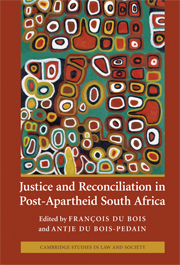Book contents
- Frontmatter
- Contents
- List of tables and figures
- List of contributors
- Acknowledgements
- List of abbreviations
- Introduction
- 1 Reconciliation as surrender: configurations of responsibility and memory
- 2 Radical forgiveness: transforming traumatic memory beyond Hannah Arendt
- 3 Communicating criminal and political responsibility in the TRC process
- 4 The contribution of criminal justice
- 5 Reparation and the forms of justice
- 6 Land restitution and reconciliation in South Africa
- 7 For justice and reconciliation to come: the TRC archive, big business and the demand for material reparations
- 8 Transition, forgiveness and citizenship: the TRC and the social construction of forgiveness
- 9 The evolving legitimacy of the South African Constitutional Court
- 10 Drawing the line: justice and the art of reconciliation
- 11 Post-conflict justice and the reconciliatory paradigm: the South African experience
- Index
- References
11 - Post-conflict justice and the reconciliatory paradigm: the South African experience
Published online by Cambridge University Press: 01 July 2009
- Frontmatter
- Contents
- List of tables and figures
- List of contributors
- Acknowledgements
- List of abbreviations
- Introduction
- 1 Reconciliation as surrender: configurations of responsibility and memory
- 2 Radical forgiveness: transforming traumatic memory beyond Hannah Arendt
- 3 Communicating criminal and political responsibility in the TRC process
- 4 The contribution of criminal justice
- 5 Reparation and the forms of justice
- 6 Land restitution and reconciliation in South Africa
- 7 For justice and reconciliation to come: the TRC archive, big business and the demand for material reparations
- 8 Transition, forgiveness and citizenship: the TRC and the social construction of forgiveness
- 9 The evolving legitimacy of the South African Constitutional Court
- 10 Drawing the line: justice and the art of reconciliation
- 11 Post-conflict justice and the reconciliatory paradigm: the South African experience
- Index
- References
Summary
INTRODUCTION
Every transition to democracy is a morally hazardous undertaking. This is due to the standing risk that the construction of a new society might result in the conscription of the individuals that are to be its members. This danger is particularly acute when, as in South Africa, the transition takes place in a context marked by wide-ranging and long-standing injustices. A variety of factors may make it impossible to address these through the standard mechanisms of corrective justice: criminal prosecutions might not be practically feasible and/or might threaten the possibility of a transition, while compensation and restitution might flounder on the difficulty of proving the causal link between current circumstances and events distant in time and space. Yet, if the victims of such injustices are left without ‘a moral response, one that is more specific than the hope of building a better democracy’, then, as Amy Gutmann and Dennis Thompson have insisted, ‘the new democracy will be morally flawed from its inception’. For then the victims of the past are turned into victims of the new. They are made to pay the price for a democracy in which others may hope to enjoy freedom from the sufferings they have already experienced. In so far as their specific moral interests remain unaddressed, the victims of historical injustice would be no more than conscripted members of the new democracy.
- Type
- Chapter
- Information
- Justice and Reconciliation in Post-Apartheid South Africa , pp. 289 - 311Publisher: Cambridge University PressPrint publication year: 2009



